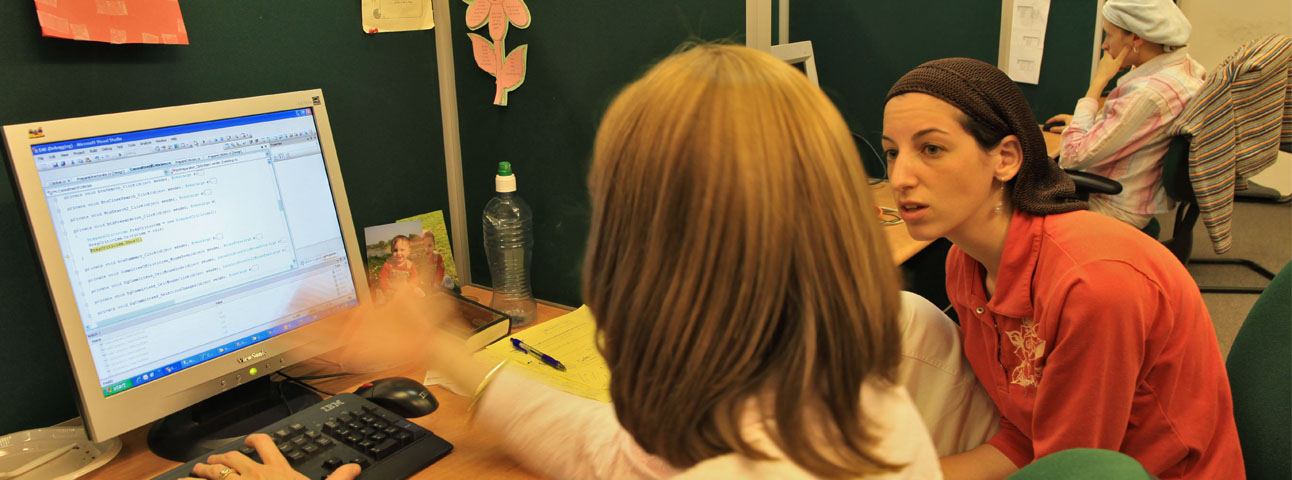Employment of Ultra-Orthodox Women—the Next Revolution?
An increasing number of young Ultra-Orthodox women are choosing not to go down the traditional path of studies preparing them for a teaching career. Instead, they are enrolling in academic institutions to study subjects that will help them embark on a professional career and hopefully be reflected in their income.

Flash 90
Since the birth of Israel, there have been two major watersheds in the employment of ultra-Orthodox women in Israel. Not many are aware of this, but in recent years we have been in the throes of a fierce battle being waged with regard to another emerging change.
Let’s start at the beginning. In traditional Jewish society, women's role was to raise children and maintain the home. But the new situation in which their husbands spend all day studying Torah and do not work to support the family forced these women to become the main breadwinners in their families. Over time, what was born out of necessity turned into the prevalent and preferred situation and was reflected in the ultra-Orthodox educational system. Today, beginning with elementary school, the education of ultra-Orthodox girls is channeled in such a way as to enable them to hold jobs outside the home. The results are clear: between 2003 and 2020, the percentage of Haredi women working outside the home jumped from 51% to 78%, which is close to the figure for other Jewish women in Israel (83%).
That’s not all. In recent years, another revolution has been taking place; this one—with regard to the diversity of their occupations. In the past, the dream job of Haredi women was to be teachers—a profession highly regarded in Haredi society and allowing women to work within the community, with convenient hours, that did not interfere unduly with their child-raising responsibilities—ideal for the wife of a kollel student, engaged in full-time Torah-study. But the oversupply of teachers and the relatively limited number of open positions in the Haredi school system, meant that many seminary graduates could not find a teaching job. In addition, teachers’ salaries especially for part-time positions, no longer stretch far enough to make ends meet in an ultra-Orthodox family in the current economic situation. As a result, seminaries attended by young ultra-Orthodox women after high school, opened diverse new study tracks, including in fields such as practical software engineering, bookkeeping, tax consultancy, and multimedia.
But the picture is not all rosy. Despite these positive developments and the diversification of both study programs and areas of employment, the seminaries themselves are far from eager to train their students for fields that deviate from the traditional mold. They do so only because they have no choice. In their eyes, it t would be far more preferable for their graduates to work inside the community and, if possible, to also hold a teaching certificate. Most seminary graduates get the message and comply; most still prefer jobs within the community with shorter hours. This explains why the average income among Haredi women remains very low—only two-thirds that of other Jewish women.
The key to change rests with colleges and universities. In recent years, many of them have opened special tracks for ultra-Orthodox women in a wide range of fields—computer science, psychology, social work, and nursing. The three years required to obtain a degree require more time and effort than studies for a teaching certificate in the seminaries. What is more, the academic programs are oriented towards careers in society at large, including in Israel's civil service. Their graduates find a way to combine their ultra-Orthodox world with a job in the "secular" labor market; no less importantly, they are able to develop a career that suits their talents, reflected also in their compensation. By way of example, an ultra-Orthodox woman with an academic degree draws a salary that is a third higher than those without a degree.
Today, more and more ultra-Orthodox women who complete high school choose to "skip" over the seminary studies and proceed directly to a college or university, because they understand they will get much more out of the study tracks offered by the latter. The bottom line is that they play an important role in supporting their families, and traditional work in the field of education is no longer feasible, as there are too many teachers in the system, and many women have to go outside their communities to find work. The seminaries, for their part, have not stood aside, and are waging a stubborn battle against academic studies, and are fighting for the young women’s hearts and minds—thus far with limited success. 45% of Haredi women students in higher education frameworks are under the age of 21, which indicates that the academic route is an attractive one for them. We can only hope that academic studies will become more and more the norm, and offer a pragmatic option for the next generation of young ultra-Orthodox women.
The article was published in the Times of Israel.
